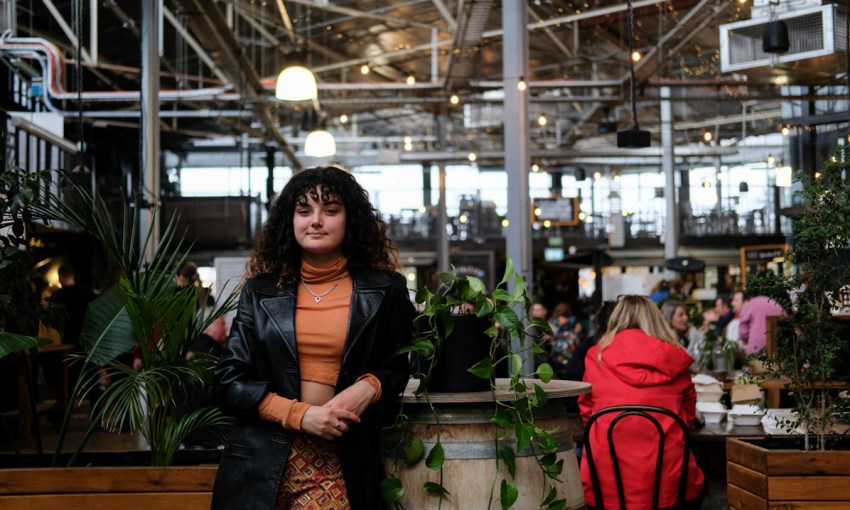In the first episode of new podcast 20:MinuteCity, architect Dino Vrynios and his guests debate if the city is really meeting the needs of local creatives.
Adelaide’s arts scene needs to engage our new generation of creatives
Adelaide has long been proud of the relative scale and stature of its arts and festivals sector. We’ve even emblazoned ‘Festival State’ on our number plates for almost three decades.
The 20:MinuteCity podcast is collaboration between Das Studio’s Future Forum series and CityMag.
The first episodes are available now via Apple Podcasts and Spotify.
This article was produced in collaboration with Das Studio.
But while there’s no doubt the arts are central to many people’s sense of what it is to live in Adelaide, it’s not necessarily a scene that speaks to all ages and demographics.
These issues and others are explored in the first episode of the 20:MinuteCity podcast, a new collaboration between architecture and design practice Das Studio and CityMag, which follows on from Das Studio’s Future Forum event series.
In each episode of the podcast, Das Studio director, Future Forum founder and 20:MinuteCity host, Dino Vrynios speaks to notable Adelaideans about what their city means to them now, and what they want it to become in the future.
In this first instalment, Art Gallery of South Australia Director Rhana Devenport provides a perspective on the importance of art during the COVID-19 pandemic.
To Rhana, artists play an essential role in creating portals to the imagination.
“Never in my lifetime has the role of art in society been distilled so clearly,” Rhana says.
“Now, as the world finds itself negotiating through utterly unexpected conditions… it is artists who we turn to in our imposed solitude, and it is artists who continue to inspire and challenge us as we reacquaint ourselves with the new world disorder.
“In the transporting music we listen to, the absorbing books we read, the performances and films we watch online, or the visual art that brings us quiet joy.”
In this first episode, 20:MinuteCity journalist Angela Skujins also introduces listeners to 19-year-old actor Luca Sardelis, star of SBS’s The Hunting.
On the cusp of a successful career in the arts, Luca is also at a crossroads. She describes Adelaide as a big country town where she feels safe and connected; however, she’s not sure the local arts sector can provide her the cultural and professional opportunities she craves.
“If you look at the NGV [in Melbourne]… it’s more of a… pastime for young people than the art gallery is here,” she says.
“Like, how many times do you hear of people [in Adelaide] catching up to go to the art gallery? It doesn’t happen very often. Maybe that’s because the gallery over there (the NGV) is more inviting, more interactive, it appeals more to a younger audience, whereas we’re very traditional here.
“I think a city full of art is a city that’s thriving.”
Luca feels that people like her don’t necessarily fit the mould of an Adelaidean.
“If we ostracise people like me that are a bit different, who’s going to spice up Adelaide?”
Dino’s studio guest Angelique Edmonds, who is senior lecturer of architecture at the University of South Australia, sympathises with Luca’s point of view.
However, as a native Sydney-sider who moved to Adelaide 12 years ago, Angelique wants to encourage younger people to understand that Adelaide isn’t a static place, and if they stay, they themselves can shape its future.
She also believes younger people may not appreciate that Adelaide’s connectedness provides opportunities that don’t exist in bigger cities.
“They may not be aware of it… but when you move to a bigger city, it really is hard to get a start,” Angelique says.
“You’re not one person or six people in the queue for a job, you’re 27 or 2700. So in Adelaide, the fact that you can meet someone in the café that might end up being someone who knows someone who might help you get that job – that doesn’t happen in the bigger cities… the probability is much less.
“A lot of those aspects of Adelaide are extraordinary and [there is] much more access and opportunity in ways that perhaps younger people don’t appreciate, because they don’t have the context of comparison of having lived in a bigger city.”
20:MinuteCity returns for episode two with resilience coach Soren Christenson, and will delve into the themes explored in Angelique Edmonds’ book Connecting People, Place and Design.




